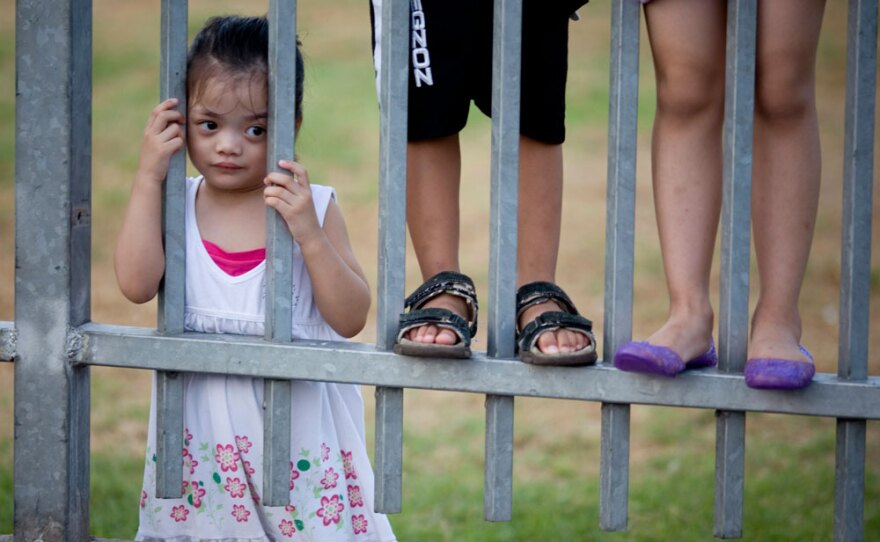An Israeli government plan to deport at least 400 children of foreign workers has created deep divisions in the country. The children are to be deported because they don't meet new residency requirements -- such as living in Israel for the last five years and attending grade school.
But the decision has prompted heated debate among Israeli Jews over who should have a right to Israeli citizenship.
A seemingly never-ending tide of people pours into the cramped offices of the Hotline for Migrant Workers in Tel Aviv. It's one of a handful of organizations working around the clock to try to help foreign workers in Israel whose children are at risk of deportation.
Each person who comes through the door has a crisis. Each is facing a bureaucratic tangle or seeking legal loopholes.
And each has only two weeks left to sort out the paperwork and applications before an Israeli government deadline.
Sensitive Chord In Country Created As A Sanctuary
Henrietta Yabou, a 38-year-old from Ghana, was pregnant with her daughter when she arrived legally in Israel 15 years ago -- but then overstayed her visa.
Alone and scared, she stayed in Tel Aviv, hoping to create a better life for her daughter.
"I'm a single mother. For the past 15 years, I'm the only person who [has] provided everything for her. I decided to stay, to seek a greener pasture," Yabou says.

But now her daughter is at risk of deportation because of a mix-up on her birth certificate, says Yabou.
Images of children slated for deportation have filled Israeli television screens -- prompting expressions of sympathy among many Israelis who see the children speaking Hebrew and playing on the same playgrounds as their own children.
The issue has struck a sensitive chord among many in Israel, a country created as a sanctuary for persecuted Jews.
Yonatan Bergman is an Israeli lawyer who represents foreign workers.
"Although there is a lot of discourse around the Holocaust and Israeli people being morally committed to giving refuge to people in danger, I think this is merely lip service," Bergman says.
Israel has no formal laws regarding refugees or asylum seekers. The country is struggling to cope with the estimated 250,000 foreign workers who now reside in Israel. While some of those came expressly as migrant workers seeking better wages, many others came from countries like Sudan and Eritrea, fleeing persecution.
'Try Telling Them They Aren't Israeli'
In Yabou's case, she was born in Ghana but her father is Nigerian. She says Israeli officials have repeatedly denied her daughter's request for residency due to inconsistent records.
Her now teenage daughter can't understand, says Yabou. Israel is the only home she's ever known. Even without legal papers or any affiliation to Judaism, Yabou says her daughter says the Jewish prayer over food when she eats and plans to volunteer to serve in the Israeli military.
"She would say that, 'I'm Israeli, I'm Israeli, I'm Israeli.' She does everything in an Israeli way," Yabou says.
The Ministry of the Interior would not answer requests on specific cases like Yabou's. But the minister, Eli Yishai, has emerged as one of the most hard-line supporters of deportation of illegal migrants.
Yishai made headlines this week when he told Israeli parliament members that foreign workers' children in Israel needed to be told that their field trip has ended.
He asked: Are we afraid that these kids are going to stand up and cry?
In the offices of the Hotline for Migrant Workers, director Sigal Rosen points to a group of Filipino children playing with toy blocks.
"They are playing games and speaking Hebrew," she says. "Try telling them they aren't Israeli."
Copyright 2022 NPR. To see more, visit https://www.npr.org. 9(MDAzMjM2NDYzMDEyMzc1Njk5NjAxNzY3OQ001))






